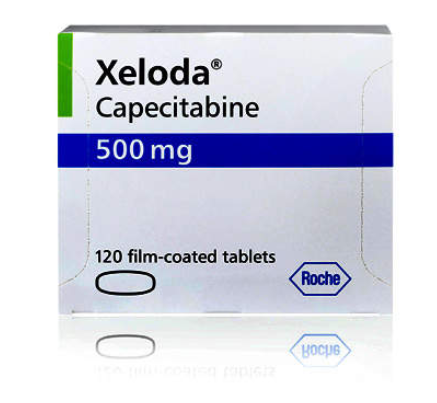Visit DoctorOnCall Singapore
You seem to be shopping from Singapore

You are currently on DoctorOnCall.com.my, our Malaysian site.
To serve you better, would you like to head over to DoctorOnCall Singapore ?
Sign Up / Log In
Account
Online Pharmacy
Doctor Services
Health Centre
Bulk Purchase
Corporate
✕
Voucher Redeemed!
Voucher will be automatically applied upon checkout
*Limited to 1 use per customer only
*DOC reserves the right to reverse the voucher redemption and cancel any orders associated if the code is used more than once
Sold Out


Prescription Required
Select Variant
Product Added to Your Cart

Xeloda 500mg Tablet 120s
RM 1874.70
The Xeloda 500mg tablet can be used, as prescribed by the doctor, to treat certain diseases. It is used as part of chemotherapy itself or in conjunction with any other medication.
After having a meal, Xeloda 500mg tablet should be taken within 30 minutes. Your doctor can determine the suitable dosage regimen based on the condition. This depends on what you are being treated for and can vary from time to time. You can take medication exactly as prescribed by the doctor. It may cause some severe side effects if you use it in the wrong manner or take too long.
Tell the doctor before using medication if you have liver or kidney conditions or if you are using other medications to cure illnesses. This medicine can interact with different medicines, please let your doctor know all the medicines you are taking. During pregnancy or even during breastfeeding, this medicine is not advised. During therapy, the use of reliable contraceptive by both males and females is essential as it affects the effectiveness.
Many side effects require minimal medical assistance and fades as the body responds to the medicine. Speak to the doctor if they continue or if you are particularly worried.
Vomiting, fatigue, nausea, stomach pain, and diarrhea are the most frequent side effects of this medicine. This medicine may reduce the number of blood cells in the blood, thus raising the susceptibility of infections. To monitor the blood cells together with heart, liver, and blood uric acid levels, routine blood tests are required.
1. Chabner BA, Bertino J, Cleary J, et al. Cytotoxic Agents. In: Brunton LL, Chabner BA, Knollmann BC, editors. Goodman & Gilman’s: The Pharmacological Basis of Therapeutics. 12th ed. New York, New York: McGraw-Hill Medical; 2011. p. 1698.
2. Chu E, Sartorelli AC. Cancer Chemotherapy. In: Katzung BG, Masters SB, Trevor AJ, editors. Basic and Clinical Pharmacology. 11th ed. New Delhi, India: Tata McGraw Hill Education Private Limited; 2009. p. 947.
3. Briggs GG, Freeman RK, editors. A Reference Guide to Fetal and Neonatal Risk: Drugs in Pregnancy and Lactation. 10th ed. Philadelphia, PA: Wolters Kluwer Health; 2015. p. 191.
4. Capecitabine. North Harrow, Middlesex: Accord Healthcare Limited; 2012 [revised 12 Oct. 2018]. [Accessed 26 Mar. 2019] (online)
5. Drugs.com. Capecitabine. [Accessed 26 Mar. 2019] (online)
6. Drugs and Lactation Database (LactMed) [Internet]. Bethesda (MD): National Library of Medicine (US); 2006. Capecitabine. [Updated 2018 Dec 3]. [Accessed 18 Feb. 2020] (online)
7. Central Drugs Standard Control Organisation (CDSCO). [Accessed 27 Mar. 2019] (online)